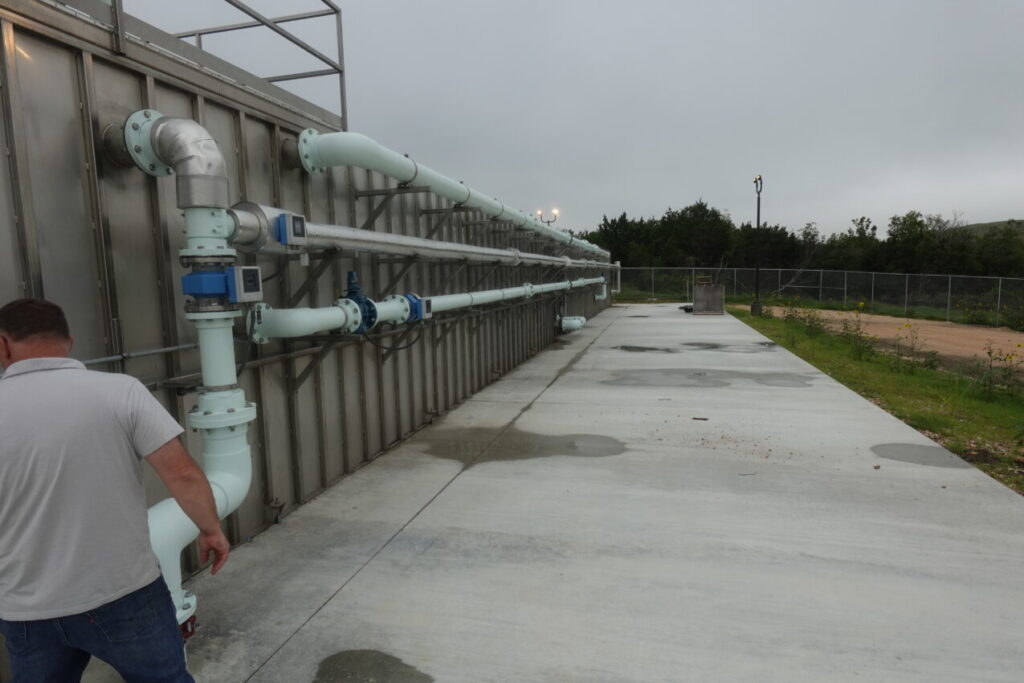Land Application Permits for Treated Wastewater: A Texas Developer’s Guide
When your development project needs wastewater treatment but traditional discharge options aren’t available or practical, land application permits offer a proven alternative. For developers and engineering firms working in Texas, understanding when and how to pursue land application permits through TCEQ can save months of permitting time and open doors to projects that might otherwise stall.
What Is a Land Application Permit?
A land application permit authorizes the beneficial reuse of treated wastewater by applying it to land surfaces for irrigation, landscape maintenance, or agricultural purposes. Instead of discharging treated effluent into a stream or river, the water is distributed across designated land areas where it provides irrigation benefits while naturally filtering through soil and vegetation.
In Texas, these permits fall under TCEQ’s Texas Pollutant Discharge Elimination System (TPDES) program. The key difference from traditional discharge permits is that treated wastewater never reaches surface waters directly—it’s absorbed by soil and plants or evaporates, making it an environmentally beneficial disposal method when properly designed and managed.

When Land Application Makes Sense
Land application permits are particularly valuable in several common scenarios that Texas developers and engineers encounter regularly:
Remote Development Sites: If your project is far from existing wastewater infrastructure and stream discharge isn’t feasible due to distance or environmental restrictions, land application provides a viable path forward. Many rural subdivisions and commercial developments use this approach successfully.
Water Reuse Opportunities: Developments with golf courses, parks, green spaces, or agricultural components can integrate treated wastewater into their irrigation systems. This creates a dual benefit—permitted wastewater disposal and reduced potable water demand for landscaping.
Restrictive Discharge Standards: Some watersheds have strict water quality requirements that make traditional discharge permits expensive or difficult to obtain. Land application sidesteps many surface water quality concerns by keeping effluent out of streams entirely.
Faster Permitting Timelines: Traditional TPDES discharge permits in Texas currently take 12-18 months due to TCEQ staffing constraints and the complexity of surface water quality reviews. Land application permits, when properly designed, can often be approved in 6-9 months because they avoid many of the stream-specific water quality analyses required for discharge permits.
Key Technical Requirements
Obtaining a land application permit requires careful attention to several technical considerations that TCEQ evaluates closely:
Treatment Standards: Your wastewater must be treated to specific quality levels before land application. TCEQ typically requires secondary treatment as a minimum, though the exact standards depend on the application method and site conditions. Total Suspended Solids (TSS), Biochemical Oxygen Demand (BOD), and pathogen reduction are primary concerns.
Site Characteristics: The permit application must demonstrate that your land application site has appropriate soil types, adequate area, proper slopes, and sufficient separation distances from property lines, water wells, and surface waters. TCEQ requires detailed site evaluations including soil borings, percolation testing, and groundwater depth assessments.
Hydraulic Loading Rates: You must calculate and justify the volume of treated wastewater applied per acre based on soil infiltration capacity, crop or vegetation water requirements, and climatic conditions. Over-application creates ponding, runoff, and groundwater contamination risks that TCEQ reviews carefully.
Application Method: Whether you’re proposing spray irrigation, drip irrigation, or surface distribution affects permit requirements. Spray irrigation is common but requires wind drift controls and public access restrictions. Subsurface drip systems often face fewer public health concerns but involve higher installation costs.
Storage Requirements: Texas weather patterns create challenges—you can’t apply wastewater during heavy rain or when soils are saturated. TCEQ requires adequate storage capacity (typically 30-60 days) to hold treated effluent during wet periods or when application isn’t possible.
The TCEQ Permitting Process
The land application permit process in Texas follows a structured pathway that begins with a complete application package submitted to TCEQ. Your application must include detailed engineering plans, an operations and maintenance manual, site assessments, and hydraulic calculations demonstrating compliance with TCEQ rules.
TCEQ conducts technical reviews focusing on treatment adequacy, site suitability, and operational feasibility. Unlike discharge permits, land application permits typically don’t require extensive surface water quality modeling, which accelerates the review timeline significantly.
Public notice requirements apply, though land application permits generally attract less opposition than discharge permits since there’s no direct impact to streams or rivers. However, nearby property owners may have concerns about odors, spray drift, or property values that should be addressed proactively in your application.
Once approved, land application permits include specific operating conditions you must follow: maximum application rates, required monitoring schedules, record-keeping requirements, and response protocols for equipment failures or adverse weather conditions.
Working with Modern Engineering Solutions
At Modern Engineering Solutions, we’ve guided numerous Texas developers through the land application permitting process. Our licensed engineers understand TCEQ’s technical requirements and can evaluate whether land application is the right choice for your project during initial feasibility discussions.
We handle the complete permitting process—from site evaluations and treatment system design through application preparation and TCEQ coordination. Our experience with land application projects across Colorado and Texas means we anticipate reviewer questions and structure applications for efficient approval.
Whether you’re developing a rural subdivision, planning a commercial center beyond city sewer service, or looking for alternatives to expensive discharge permits, our team can assess your options and deliver a complete land application permit package that meets TCEQ standards.
Contact Modern Engineering Solutions at (214) 833-6748 or Sales@mod-eng.com to discuss your wastewater permitting needs. Our Texas office serve clients throughout state with responsive engineering support that keeps your projects moving forward.
